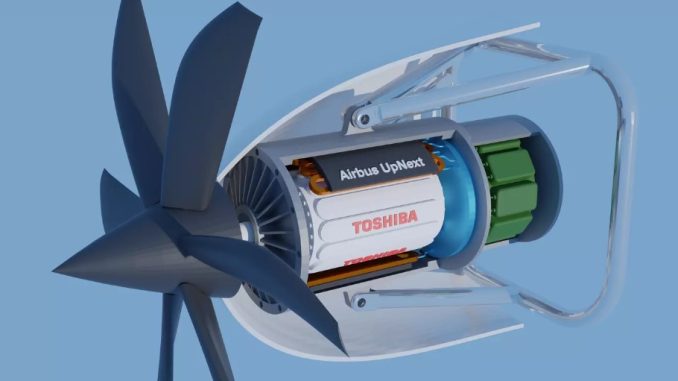
Airbus UpNext and Toshiba Energy Systems & Solutions Corporation will cooperate on superconducting technologies for future hydrogen-powered aircraft.
“Superconducting technologies offer a unique advantage for these aircraft, using -253°C liquid hydrogen as a fuel but also to efficiently cool the electric propulsion systems,” say the companies in a press release. “Cryogenic technology could allow for a nearly unimpaired power transmission within the electric systems of the aircraft, significantly improving their energy efficiency and performance.
“Through this collaboration, we aim to deliver a breakthrough technology that could unlock new design possibilities, in particular for Airbus’ future hydrogen-powered aircraft. This partnership represents a natural and essential step in advancing superconducting motor technology to meet the needs of the aerospace industry, ” said Grzegorz Ombach, Airbus Senior Vice President and Head of Disruptive R&T.
“Toshiba’s expertise in superconducting technology for high current flow, motor drive technology for precise current control, and advanced rotating machinery technology for stable, high-speed operation, forms a strong foundation for this partnership. We both recognize the tremendous potential of superconducting technologies in shaping the future of aircraft and driving the decarbonization of the aviation industry. We are confident that our collaboration with Airbus will play a key role in advancing next-generation technologies for the aerospace sector,” said Tsutomu Takeuchi, Toshiba’s Corporate Officer, responsible for Power Systems business, and Director of Toshiba Energy Systems & Solutions Corporation.
The partners aim to co-develop a two-megawatt superconducting motor.
Recently, Airbus UpNext launched Cryoprop, a demonstrator to test a two megawatt-class superconducting electric propulsion system. Toshiba has been conducting research and development of superconducting technology applications for nearly half a century and has released its own two megawatt-class superconductivity motor prototype for mobility applications in June 2022.
The Airbus Tech Hub Japan was announced in May 2024. This initiative is designed to develop partnerships in the country to advance research, technology and innovation in aerospace and push boundaries to prepare for the next generation of aircraft. The partnership between Toshiba and Airbus is the first achievement of this ambition in Japan.
https://www.airbus.com/en/newsroom/press-releases/2024-10-airbus-and-toshiba-to-partner-on-superconductivity-research

